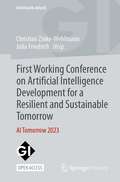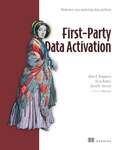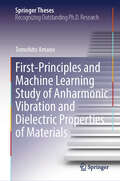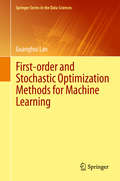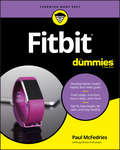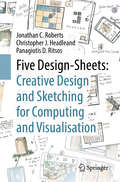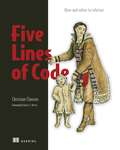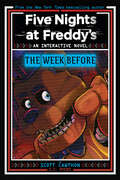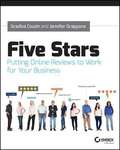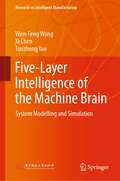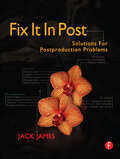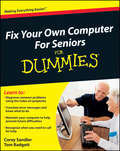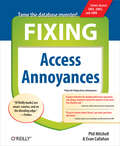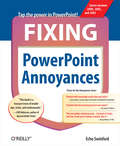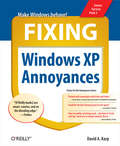- Table View
- List View
First Working Conference on Artificial Intelligence Development for a Resilient and Sustainable Tomorrow: AI Tomorrow 2023 (Informatik aktuell)
by Julia Friedrich Christian Zinke-WehlmannKünstliche Intelligenz ist ein Treiber der digitalen Transformation von Unternehmen, welche die gesamte Organisation, einschließlich ihrer Strukturen, Prozesse und Mitarbeitender berührt.Die AI Tomorrow Konferenz möchte die menschzentrierte Perspektive auf KI und ihren nachhaltigen Einsatz, im ökologischen wie auch ökonomischen und sozialen Sinne, stärker ins Zentrum des wissenschaftlichen Diskurses rücken.Dies ist ein Open-Access-Buch.Der Inhalt: Die Autor:innen beleuchten Aspekte der KI-Entwicklung und des Einsatzes. Nach einer Einführung zu Resilienz und Nachhaltigkeit von KI erscheinen die Beiträge entsprechend ihrer Zuordnung zu den Konferenzsessions:(I) Digital transformation of organizations or processes through AI(II) Opportunities of AI for society(III) AI supported knowledge management and learning(IV) Manufacturing and factories of the futureDie Zielgruppe: Wissenschaftler:innen und Interessierte aus dem Bereich der Angewandten Informatik
First-Party Data Activation: Modernize your marketing data platform
by Alina D. Magauova Oscar Kennis David H. JoostenTake a new approach to digital marketing based on transparency, relevance, and delivering real value to your audience.First-Party Data Activation shows you how to transform general customer data into a deep understanding of who your customers are, what resonates with them, and where to focus your data-driven marketing efforts. You'll discover how the world&’s most tech-savvy brands effectively collect, analyze, and act on data from direct customer interactions to drive hyper-personalized digital marketing—all with their customers&’ consent. In First-Party Data Activation you will learn how to: • Transition away from third-party cookies and fragmented point solutions • Modernize and unify your marketing technology with data lakehouses and composable customer data platforms (CDPs) • Build sustainable and privacy-compliant data collection, consent management, and data ethics into your marketing by design • Scale hyper-personalization and collaboration using generative AI and data clean rooms • Prove the impact of your marketing with robust experimentation and marketing analytics • Drive faster marketing operations and marketing analytics to achieve higher growth The future of marketing lives in first-party data—and this book is your key to unlocking its full potential. More than a manual, First-Party Data Activation is a strategic guide full of real-world examples to help you navigate the complex AI and data landscape with confidence, ethics, and unprecedented strategic insight. Foreword by Murat Genc, CIO / CDO / CTO at P&G | Whirlpool | McLane. About the technology Website clicks and interactions, customer purchase history and contact data, email opens and unsubs, and other data you collect directly from your customers is pure gold for modern digital marketing. This first-party data tells you exactly who your customers are and what resonates with them. In this book, you&’ll learn how to transition from cookies and other third-party tools toward sustainable and privacy-compliant data-driven marketing. About the book First Party Data Activation introduces techniques to collect and act on first-party data to drive growth—all with your customer&’s consent. You&’ll start with the basics of privacy-centric marketing, including the evolving regulations around data collection and usage. Then, you&’ll explore concrete techniques for gathering, storing, and analyzing first-party data to level up targeting and personalization, including how to use AI agents and applications effectively. Along the way, you&’ll also develop a first-party data platform that provides a clear view of your customers to your marketing tools and teams. What's inside • Transparency, consent, and data ethics in your marketing • Modernize marketing technology with data lakehouses and composable CDPs • Hyper-personalize messaging using AI and data clean rooms • Achieve higher growth for your company About the reader For marketing professionals who want to maximize their data&’s potential. About the authors Alina D. Magauova is the founder of Segment360, a brand strategist, and a product marketing leader. Oscar Kennis is the founder of OPSangels Consultancy and has over two decades of experience in the technology sector. David H. Joosten is the co-founder of GrowthLoop and a former Google marketer. Table of Contents Part 1 1 First-party data in the digital marketing space 2 Privacy-centric marketing 3 Marketing first-party data: Crawl, walk, run 4 Choosing your first-party data solution Part 2 5 Modernizing the marketing data platform: Data lakehouses and composable CDPs 6 Identity resolution and enrichment: Building a complete customer profile 7 First-party dat
First-Principles and Machine Learning Study of Anharmonic Vibration and Dielectric Properties of Materials (Springer Theses)
by Tomohito AmanoThe book presents the author's development of two first-principles methods to calculate dielectric properties of materials based on anharmonic phonon and machine learning, and demonstrates an in-depth analysis of anharmonic crystals and molecular liquids. The anharmonic phonon method, combined with Born effective charges, is useful to study dielectric properties of crystals. The recently developed self-consistent phonon theory (SCPH) enables accurate simulations in strongly anharmonic materials. The author reveals that the combination of SCPH with the four-phonon scattering term accurately reproduces experimental spectra, and discusses how anharmonic phonon self-energies affect the dielectric properties. The second method is molecular dynamics with Wannier centers—the mass centers of Wannier functions. The author constructs a machine learning model that learns Wannier centers for each chemical bond from atomic coordinates to accurately predict the dipole moments. The developed method is, in principle, applicable to molecules of arbitrary size. Its effectiveness is demonstrated and the dielectric properties of several alcohols, including dipole moments, dielectric constants, and absorption spectra, are analyzed. This book benefits students and researchers interested in anharmonic phonons, machine learning, and dielectric properties.
First-order and Stochastic Optimization Methods for Machine Learning (Springer Series in the Data Sciences)
by Guanghui LanThis book covers not only foundational materials but also the most recent progresses made during the past few years on the area of machine learning algorithms. In spite of the intensive research and development in this area, there does not exist a systematic treatment to introduce the fundamental concepts and recent progresses on machine learning algorithms, especially on those based on stochastic optimization methods, randomized algorithms, nonconvex optimization, distributed and online learning, and projection free methods. This book will benefit the broad audience in the area of machine learning, artificial intelligence and mathematical programming community by presenting these recent developments in a tutorial style, starting from the basic building blocks to the most carefully designed and complicated algorithms for machine learning.
Fitbit For Dummies
by Paul McFedriesTake a complete tour of the Fitbit ecosystem From Fitbit features to the Fitbit app to the social features of Fitbit.com, this approachable book covers everything you need to know to get the most out of your Fitbit wristband or watch. Whether you’re a fitness newcomer, a regular walker, or a long-time exerciser, your Fitbit is a powerful device that can tell you much more than how many steps you take each day. This book offers easy-to-follow, step-by-step instructions for tracking all that data and getting the most out of your Fitbit investment. Go beyond steps to track sleep, heart rate, weight, and more Set up your health and fitness goals — then go for them! Connect to third-party apps such as Strava and Weight Watchers Stay motivated by sharing your activities with friends It’s one thing to simply wear your Fitbit, but it’s quite another to use your Fitbit to reach your personal health goals. Whether that goal is to get fit, lose weight, eat better, or reduce stress, your Fitbit has settings and features that can help you get there. And this book shows you how!
Five Design-Sheets: Creative Design and Sketching for Computing and Visualisation
by Christopher J. Headleand Jonathan C. Roberts Panagiotis D. RitsosThis book describes a structured sketching methodology to help you create alternative design ideas and sketch them on paper. The Five Design-Sheet method acts as a check-list of tasks, to help you think through the problem, create new ideas and to reflect upon the suitability of each idea. To complement the FdS method, we present practical sketching techniques, discuss problem solving, consider professional and ethical issues of designing interfaces, and work through many examples.Five Design-Sheets: Creative Design and Sketching for Computing and Visualization is useful for designers of computer interfaces, or researchers needing to explore alternative solutions in any field. It is written for anyone who is studying on a computing course and needs to design a computing-interface or create a well-structured design chapter for their dissertation, for example. We do acknowledge that throughout this book we focus on the creation of interactive software tools, and use the case study of building data-visualization tools. We have however, tried to keep the techniques general enough such that it is beneficial for a wide range of people, with different challenges and different situations, and for different applications.
Five Lines of Code: How and when to refactor
by Christian ClausenFive Lines of Code teaches refactoring that's focused on concrete rules and getting any method down to five lines or less! There&’s no jargon or tricky automated-testing skills required, just easy guidelines and patterns illustrated by detailed code samples.In Five Lines of Code you will learn: The signs of bad code Improving code safely, even when you don&’t understand it Balancing optimization and code generality Proper compiler practices The Extract method, Introducing Strategy pattern, and many other refactoring patterns Writing stable code that enables change-by-addition Writing code that needs no comments Real-world practices for great refactoring Improving existing code—refactoring—is one of the most common tasks you&’ll face as a programmer. Five Lines of Code teaches you clear and actionable refactoring rules that you can apply without relying on intuitive judgements such as &“code smells.&” Following the author&’s expert perspective—that refactoring and code smells can be learned by following a concrete set of principles—you&’ll learn when to refactor your code, what patterns to apply to what problem, and the code characteristics that indicate it&’s time for a rework. Purchase of the print book includes a free eBook in PDF, Kindle, and ePub formats from Manning Publications. About the technology Every codebase includes mistakes and inefficiencies that you need to find and fix. Refactor the right way, and your code becomes elegant, easy to read, and easy to maintain. In this book, you&’ll learn a unique approach to refactoring that implements any method in five lines or fewer. You&’ll also discover a secret most senior devs know: sometimes it&’s quicker to hammer out code and fix it later! About the book Five Lines of Code is a fresh look at refactoring for developers of all skill levels. In it, you&’ll master author Christian Clausen&’s innovative approach, learning concrete rules to get any method down to five lines—or less! You&’ll learn when to refactor, specific refactoring patterns that apply to most common problems, and characteristics of code that should be deleted altogether. What's inside The signs of bad code Improving code safely, even when you don&’t understand it Balancing optimization and code generality Proper compiler practices About the reader For developers of all skill levels. Examples use easy-to-read Typescript, in the same style as Java and C#. About the author Christian Clausen works as a Technical Agile Coach, teaching teams how to refactor code. Table of Contents 1 Refactoring refactoring 2 Looking under the hood of refactoring PART 1 LEARN BY REFACTORING A COMPUTER GAME 3 Shatter long function 4 Make type codes work 5 Fuse similar code together 6 Defend the data PART 2 TAKING WHAT YOU HAVE LEARNED INTO THE REAL WORLD 7 Collaborate with the compiler 8 Stay away from comments 9 Love deleting code 10 Never be afraid to add code 11 Follow the structure in the code 12 Avoid optimizations and generality 13 Make bad code look bad 14 Wrapping up
Five Nights At Freddy's: The Freddy Files (Five Nights At Freddy's Ser.)
by Scott CawthonThe bestselling Freddy Files is back, now updated with 64 pages of new content!The bestselling, official guidebook to Five Nights at Freddy's is back, now updated and including 64 pages of new content exploring Freddy Fazbear's Pizzeria Simulator and Ultimate Custom Night!In this official guidebook to Five Night at Freddy's, fans and gamers alike can immerse themselves in the series' mythology, gameplay, and secrets as we unwind the twisted mysteries hidden at the heart of Freddy Fazbear's Pizza. Delving into each game, players can map the animatronics' paths, learn how timed elements of the games work, and discover how to trigger unique events. Special sections throughout highlight Freddy's fans' most talked-about theories, from the identities of the "Bite of '83 and '87" victims to the history of Henry and William Afton to the recurring hallucinations of "it's me." All the evidence, along with every detail of the games, books, and more, is laid out for fans to explore in this one-of-a-kind guide to the warped world of Five Nights at Freddy's.
Five Nights at Freddy's Character Encyclopedia (Five Nights At Freddy's)
by Scott CawthonAn in-depth look at all the characters from Five Nights at Freddy's in a beautiful, deluxe hardcover format!The massive roster of characters from Five Nights at Freddy's is presented here in a giant hardcover that will make the perfect addition to any fan’s library. From the games to the novels and short stories, all the characters are here and laid out in awesome detail that will deepen the knowledge of even the most enthusiastic player. With over 200 pages of full-color art, this encyclopedia is not to be missed!
Five Nights at Freddy's Fazbear Frights Collection - An AFK Book (Five Nights At Freddy's)
by Kira Breed-Wrisley Scott CawthonFrom the #1 New York Times bestselling author and creator of Five Nights at Freddy's, don't miss this twelve-book boxed set, which includes stories that were left on the cutting room floor from books one through eleven!All eleven Fazbear Frights books in one amazing collection, plus a twelfth book of bonus stories – stories that didn't make the cut for the first eleven books! Five Nights at Freddy's creator Scott Cawthon spins three sinister novella-length in each book of this collection, with stories from different corners of his series' canon.
Five Nights at Freddy's Ultimate Guide: An AFK Book
by Scott CawthonFans won't want to miss this ultimate guide to Five Nights at Freddy’s -- bursting with theories, lore, and insights from the games, books, and more!This all-encompassing guidebook concentrates material from The Freddy Files (Updated Edition) and adds over 100 pages of new content exploring Help Wanted, Curse of Dreadbear, Fazbear Frights, the novel trilogy, and more!Fans hungry for fresh Five Nights at Freddy's lore can sink their teeth into this massive guidebook packed with mythology, gameplay, and secrets to help unwind the twisted mysteries lurking behind the smiling face of Fazbear Entertainment. Delving into each game, players can map the animatronics' paths, learn how timed elements of the games work, and discover how to trigger unique events. Special sections throughout highlight FNAF fans' most talked-about topics, from the alternate endings in Help Wanted and Curse of Dreadbear, to the new technology introduced in Fazbear Frights, to the ways that Easter eggs, rare screens, and hidden content can shed light on some of the more elusive questions in the FNAF universe. A comprehensive animatronics inventory and reproduced content from the Fazbear Entertainment Archives complete this compendium, helping fans bring their theories straight to the source. All the evidence, along with every detail of the games, books, and more, is laid out for fans to explore in this one-of-a-kind guide to the warped world of Five Nights at Freddy's.
Five Nights at Freddy's: Return to the Pit (Five Nights At Freddy's)
by Adrienne Kress Scott CawthonReturn to Freddy Fazbear's Pizza in this interactive novel in which YOU decide what happens!Dive into an interactive retelling of one of the most popular FNAF stories, and the basis for the hit video game "Into the Pit"! You the reader are Oswald, and after using the ball pit at Jeff's Pizza to travel back in time to 1985, you've brought a sadistic animatronic back into the present. Can you escape? Or will it be game over for you and your friends? With over 25 different possible endings and two difficulty settings, this one-of-a-kind, innovative novel is a uniquely entertaining experience for any Freddy fan.
Five Nights at Freddy's: The Official Movie Novel (Five Nights At Freddy's)
by Scott Cawthon Emma Tammi Seth CuddebackThe official movie novelization of the Five Nights at Freddy's movie!The hugely anticipated Five Nights at Freddy's movie from director Emma Tammi starring Matthew Lillard (Scream, Scooby-Doo) and Josh Hutcherson (The Hunger Games series, The Disaster Artist) hits theaters on October 27th, 2023, with a script from creator Scott Cawthon, Seth Cuddeback, and Emma Tammi. This movie novelization is a must-have for any Freddy fan!
Five Nights at Freddy's: The Week Before, An AFK Book (Five Nights At Freddy's)
by Scott Cawthon E. C. MyersJust in time for the 10th anniversary of Five Nights at Freddy's, return to Freddy Fazbear's Pizza in this interactive novel in which you decide what happens!Return to where it all began in this interactive novel set before the very first Five Nights at Freddy's game.You the reader are the Security Guard - and you've got five nights (or is it six?) to survive Freddy, Chica, Bonnie, and Foxy as they try to wipe you out. With over 25 different possible endings and two difficulty settings, this one-of-a-kind, innovative novel is a uniquely entertaining experience for any Freddy fan.
Five Nights at Freddy's: VIP, An AFK Book (Interactive Novel #0)
by Scott Cawthon E. C. MyersJust in time for the 10th anniversary of Five Nights at Freddy's, head to the Pizzaplex in this interactive novel in which YOU decide what happens!Get ready for an all-new Five Nights at Freddy’s experience! You the reader are Devon, and you’ve won VIP passes to the hottest place in town – Freddy Fazbear’s Mega Pizzaplex. These all-you-can-eat, all-expenses-paid tickets are guided by digital companion “Very Informative Pig” and are every kid’s dream. But does your VIP host have something more sinister in mind? With multiple endings and two difficulty settings, this one-of-a-kind, free eBook is a uniquely entertaining experience for any Freddy fan and the perfect way to get ready for the September 2024 launch of interactive novel “The Week Before”!
Five Stars
by Jennifer Grappone Gradiva CouzinCreate positive visibility for your business with this essential roadmapEveryone now understands the importance of online reviews on sites such as Yelp. This unique book helps you influence the process and leverage the results to increase sales and revenue. Five Stars is the perfect guide to a timely and crucial marketing tactic for today's savvy small business owners and marketers. Find out how to get more (and better) online reviews for your business, track and monitor them, leverage them effectively in social media and elsewhere, and handle negative reviews with aplomb.Packed with tools, techniques, and great case studies, this practical book is what you need to grab the reins, shape the online conversation, and get reviews that sell.Shows you how to get and leverage online reviews from websites such as Yelp and niche sites related to your businessExplains tools, techniques, and tactics you can use to start shaping conversations and building positive visibilityDemystifies a complex topic, empowering you to make the most of this valuable marketing tacticWritten by the expert author team of the popular and practical SEO_An Hour a Day books; the authors offer a similar task-based approach to help you succeedIf you're a retail, service, or e-commerce marketer, you won't want to miss Five Stars: Putting Online Reviews to Work for Your Business.
Five in a Row
by Jan CoffeyA Porsche careens out of control in a crowded parking lot. A brand-new SUV smashes through a dealership's plate-glass window. A Mercedes races wildly down a pier before diving off the end onto the deck of a yacht. Then two more wrecks. Witnesses report the vehicles had "a mind of their own" before each accident. Five in a row can't be a coincidence. Computer guru Emily Doyle has become the single-minded focus of a hacker determined to capture her attention. She recognizes the technology that is being used to gain control of the vehicles -- and in some way, she is connected to each of the victims. Ben Colter is the investigator called in by the automakers to find the link. As the casualties mount, Emily and Ben must unravel the puzzle of the seemingly random attacks, as a twisted mind moves from virtual reality to international terrorism.
Five-Layer Intelligence of the Machine Brain: System Modelling and Simulation (Research on Intelligent Manufacturing)
by Xi Chen Wen-Feng Wang Tuozhong YaoThis book intends to report the new results of the efforts on the study of Layered Intelligence of the Machine Brain (LIMB). The book collects novel research ideas in LIMB and summarizes the current machine intelligence level as “five layer intelligence”- environments sensing, active learning, cognitive computing, intelligent decision making and automatized execution. The book is likely to be of interest to university researchers, R&D engineers and graduate students in computer science and electronics who wish to learn the core principles, methods, algorithms, and applications of LIMB.
Fix It In Post: Solutions for Postproduction Problems
by Jack JamesThis book provides an array of concise solutions to the wide variety of problems that are faced by postproduction artists in the post process. With an application-agnostic approach, it gives proven, step-by-step methods to solving the most frequently encountered postproduction problems. Also included is access to a free, password-protected website that features application-specific resolutions to the problems presented, with fixes for working in Apple's Final Cut Studio suite, Avid's Media Composer, Adobe Premiere Pro, as well as other applications. Lessons are enhanced through eye-catching 4 color illustrations throughout. Solutions are provided for common audio, video, digital, editorial, color, timing and compositing problems, such as, but not limited to:* automated dialogue replacement, adjusting sync, and correcting pitch * turning SD into HD (and vice-versa) and restoration of old film for video* removing duplicate frames, repairing corrupt frames, and anti-aliasing * maintaining continuity, removing soft cuts, and troubleshooting timecodes* adding vignettes, removing color casts, and legalizing color* speeding shots up or slowing shots down, and smoothing timelapse* reframing shots, sky replacement, and object addition or removalThe book is presented in a "cookbook" format, allowing you to reference your exact problem in the TOC or index, go to that section, and immediately implement the solution featured.
Fix Your Own Computer For Seniors For Dummies
by Corey Sandler Tom BadgettLearn to diagnose and fix simple PC problems with this easy-to-follow guide When something goes wrong with your computer, it's frustrating and potentially expensive. With Fix Your Own Computer For Seniors For Dummies, you can find out what's wrong, how to fix it, whether you need to call in professional help, and how to practice preventive maintenance. This friendly guide avoids techie jargon and shows you how to diagnose the problem, find out whether the software or hardware is at fault, make simple repairs, and add external devices such as scanners, printers, and hard drives. It also helps you maintain your computer through basic steps like defragmenting the hard drive and cleaning out files - techniques that can prevent a lot of problems from occurring in the first place. Written specifically for first-time computer users, this book explains how to diagnose basic PC problems, understand error messages, and fix common issues Specific step-by-step procedures guide you through basic repairs such as replacing the hard drive Explains common mistakes and how to avoid them Outlines the steps for preventive maintenance, such as how to defragment the hard drive, clean files, delete old files, and organize files Explores ways to expand and enhance a computer with external devices including hard drives, Web cameras, Web phones, scanners, printers, flash drives and other hardware Shows what you can fix yourself and when to seek help from a repair service or the manufacturer Easy to read and follow, Fix Your Own Computer For Seniors For Dummies will boost your confidence when dealing with your computer and with professional technicians, too.
Fixing Access Annoyances: How to Fix the Most Annoying Things About Your Favorite Database (Annoyances)
by Phil Mitchell Evan CallahanWhen an application is part of the Microsoft Office suite, it's sure to be a leader in its field. In the realm of desktop database management, Access is top dog with millions of users. But this is one dog that can bite. Although Access is a powerful, relational tool with the fetching talents of a Labrador, it's not an easy beast to train. Still, millions of users count on Access for everything from managing parts databases to running Web catalogs to working as a front end to mondo SQL databases. But Access is chockablock with annoyances---report hassles, query conundrums, VBA bugs, arcane error messages, and more. O'Reilly's Annoyances series offer real-world help, right now, and Fixing Access Annoyances continues tradition. You'll not only squash bugs and workaround Access' limits, but you'll learn how to use Access to the max, whether you're a newbie or a seasoned pro. Coverage includes install/configuration annoyances, building better tables and queries, creating forms that work right, generating reliable and sophisticated reports, pulling in data from a variety of sources, crafting macros and VBA code to customize Access, and much more. You could grab those other books for help, but do they solve problems from page one? Meet a book of a different stripe. The authors come armed with knowledge of the program's quirks, design hurdles and interface snags. They provide you with battle plans in Fixing Access Annoyances to save you time and bouts of hair pulling. Stop information from spiraling out of control when working with Access and trying to make this #$@@#$ thing work! Don't let its quirks, bugs, and troublemaking features beat you. Who you gonna call for help? Instead of waiting on the line for tech support or searching for the answer on the Internet with its too many resources to find exactly what you need, take control of databases with Fixing Access Annoyances , your partner on database adventures.
Fixing American Politics: Solutions for the Media Age (Media and Power)
by Roderick P. HartFixing American Politics: Solutions for the Media Age brings together original chapters from 34 noted scholars from two disciplines – political science and communication – asked to identify the most pressing problems facing the American people and how they can be solved. Authors address the questions succinctly and directly, with their favored solutions featured in chapter titles that exhort and inspire. The book gives the reader much to think about and debate. Should news outlets be funded with public money rather than by private enterprise? Are the new social media a boon or a bane to political elections? Is the American past dead, or is it living once again? Do churchgoers and environmentalists have anything to discuss? Is the FCC doing its job? Can political ads be made less toxic? Should Fox News be "cancelled?" Should cancel cultures be cancelled? Can we become more civil to one another and, if so, how? Fixing American Politics poses all the best questions … and offers some concrete answers as well. This book is perfect for students, citizens, the media, and anyone concerned with contemporary challenges to civic life and discourse today.
Fixing Bad UX Designs: Master proven approaches, tools, and techniques to make your user experience great again
by Lisandra MaioliA practical guide filled with case studies and easy solutions to solve the most common user experience issues Key Features 1.Understand and fix the pain points of a bad UX design to ensure greater customer satisfaction. 2.Correct UX issues at various stages of a UX Design with the help of different methodologies for fixing bad UXs 3.See best practices and established principles in UX with case studies illustrating these practices and principles Book Description Have your web applications been experiencing more hits and less conversions? Are bad designs consuming your time and money? This book is the answer to these problems. With intuitive case studies, you’ll learn to simplify, fix, and enhance some common, real-world application designs. You’ll look at the common issues of simplicity, navigation, appearance, maintenance, and many more. The challenge that most UX designers face is to ensure that the UX is user-friendly. In this book, we address this with individual case studies starting with some common UX applications and then move on to complex applications. Each case study will help you understand the issues faced by a bad UX and teach you to break it down and fix these problems. As we progress, you’ll learn about the information architecture, usability testing, iteration, UX refactoring, and many other related features with the help of various case studies. You’ll also learn some interesting UX design tools with the projects covered in the book. By the end of the book, you’ll be armed with the knowledge to fix bad UX designs and to ensure great customer satisfaction for your applications. What you will learn Learn about ROI and metrics in UX Understand the importance of getting stakeholders involved Learn through real cases how to fix bad UX Identify and fix UX issues using different methodologies Learn how to turn insights and finding into practical UX solutions Learn to validate, test and measure the UX solutions implemented Learn about UX refactoring Who this book is for This book is for anyone confronted with a poorly designed UX. It is ideal for UX professionals who want to solve problems with existing UX designs, and UX designers who want to enhance their designs or analyze and rectify where they went wrong.
Fixing PowerPoint Annoyances: How to Fix the Most Annoying Things About Your Favorite Presentation Program (Annoyances)
by Echo SwinfordIf you're vexed and perplexed by PowerPoint, pick up a copy of Fixing PowerPoint Annoyances . This funny, and often opinionated, guide is chock full of tools and techniques for eliminating all the problems that drive audiences and presenters crazy. There's nothing more discouraging than an unresponsive audience--or worse, one that snickers at your slides. And there's nothing more maddening than technical glitches that turn your carefully planned slide show into a car wreck. Envious when you see other presenters effectively use nifty features that you've never been able to get to work right? Suffer no more! Fixing PowerPoint Annoyances by Microsoft PowerPoint MVP Echo Swinford rides to the rescue. Microsoft PowerPoint is the most popular presentation software on the planet, with an estimated 30 million presentations given each day. So no matter how frustrated you get, you're not about to chuck the program in the Recycle Bin. Fixing PowerPoint Annoyances , presents smart solutions to a variety of all-too-familiar, real-world annoyances. The book is divided into big categories, with annoyances grouped by topic. You can read it cover to cover or simply jump to the chapter or section most relevant to you. Inside its pages you'll learn how to create your own templates, work with multiple masters and slide layouts, and take advantage of various alignment and formatting tools. You'll also learn how to import Excel data; insert graphics, PDF, and Word content; create, edit, and format organization charts and diagrams; use action settings and hyperlinks to jump to other slides; and add sound, video, and other types of multimedia to spark up your presentations. Entertaining and informative, Fixing PowerPoint Annoyances is filled with humorous illustrations and packed with sidebars, tips, and tricks, as well as links to cool resources on the Web.
Fixing Windows XP Annoyances
by David A. KarpWindows XP is the most popular operating system on the planet--and the most annoying. From incomprehensible error messages to inexplicable crashes, from wonky wireless setups to just finding a file, Windows can make your computing life a nightmare. But thanks to Fixing Windows XP Annoyances, you can banish the bugs, speed up operations, and just make Windows work right. Inspired by author David Karp's Windows XP Annoyances for Geeks, this all-new tome pulls together tips, tricks, insider workarounds, and fixes for PC novices and pros, in a handy, accessible Q&A format that lets you find the solutions in a flash. Fixing Windows XP Annoyances will not only increase your productivity but lower your blood pressure. Karp's new book covers: Setup and Hardware-Update Windows, reinstall Windows safely, speed up start up, resolve driver-hardware conflicts, and more. Windows Interface-Navigate quickly, fix screen resolution problems, customize the desktop, and switch applications more quickly. Windows Explorer-Force XP's file & folder management application to remember your view settings, save your default application choices, and get XP's Search tool to behave. Multimedia-Having a problem playing a video or burning a CD? Want to do more with your digital photo collection? We have the answers. Web and Email-Get a handle on spyware, spam and pop-ups; protect your privacy online; learn how to improve your online experience. Wireless and Home Networking-Connect all your PCs; share Internet connections; share files and drives securely; make your wireless network purr; share network printers; and more. If you're having a problem, just look through the Table of Contents for the annoyance that most closely matches your problem, or feel free to start thumbing through the pages. You'll likely find a fix to a problem you didn't even know could be solved.
